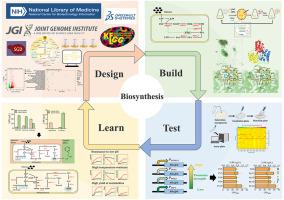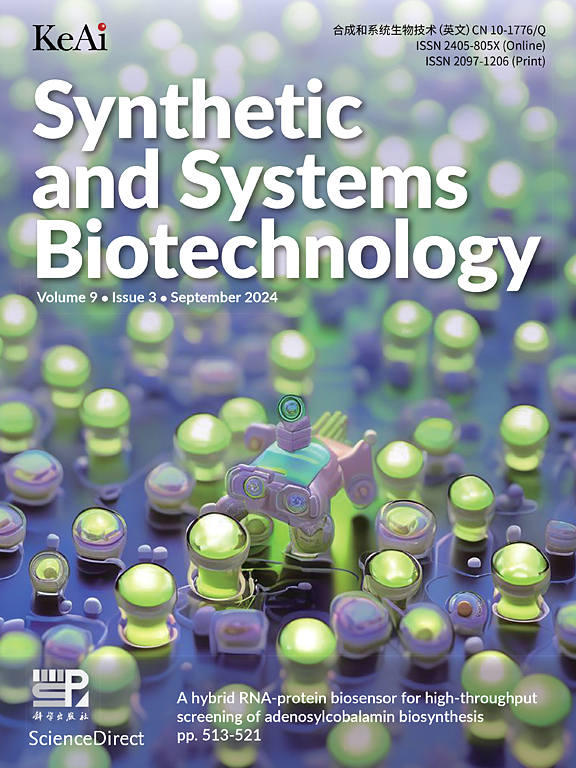毕赤酵母中2-苯乙醇高水平从头合成的代谢重编程和计算辅助蛋白质工程
IF 4.4
2区 生物学
Q1 BIOTECHNOLOGY & APPLIED MICROBIOLOGY
引用次数: 0
摘要
2-苯乙醇(2-PE)是一种芳香化合物,具有特有的玫瑰香味,在食品和化妆品工业中广泛用作调味剂和芳香剂。由于从天然植物中获取2-PE的局限性,微生物细胞工厂为可持续生物合成提供了一个有前途的选择。本研究利用毕赤酵母高效合成2-PE。利用计算机辅助预测关键的苯丙酮酸脱羧酶KDC2与其底物或产物之间的相互作用,合理设计了最佳的酶变体,以提高2-PE的产量。此外,莽草酸途径增强,并采用动态调控启动子来减少来自替代途径的竞争。这些策略显著增加了2-PE产生的代谢通量,达到2.81 g/L,比非工程菌株提高了45.8倍。通过控制碳饲养和原位提取来减轻乙酸抑制和产物毒性,重组菌株最终的2-PE滴度为7.10 g/L,葡萄糖产量为0.14 g/g,是迄今为止报道的最高微生物产量。这项研究强调了pastoris作为绿色生物合成2-PE和其他天然产物的多功能细胞工厂的巨大潜力。本文章由计算机程序翻译,如有差异,请以英文原文为准。

Metabolic reprogramming and computation-aided protein engineering for high-level de novo biosynthesis for 2-phenylethanol in Pichia pastoris
2-Phenylethanol (2-PE), an aromatic compound with a characteristic rose fragrance, is extensively used in the food and cosmetic industries as a flavoring and fragrance agent. Due to limitations in obtaining 2-PE from natural plant sources, microbial cell factories offer a promising alternative for sustainable biosynthesis. In this study, Pichia pastoris was engineered to efficiently synthesize 2-PE. Using computer-assisted predictions of interactions between the key phenylpyruvate decarboxylase KDC2 and its substrates or products, an optimal enzyme variant was rationally designed to boost 2-PE production. Additionally, the shikimic acid pathway was enhanced, and a dynamic regulation promoter was employed to reduce competition from alternative pathways. These strategies significantly increased metabolic flux toward 2-PE production, achieving a titer of 2.81 g/L and 45.8-fold improvement over the non-engineered strain. By integrating controlled carbon feeding and in situ extraction to alleviate acetic acid inhibition and product toxicity, the recombinant strain achieved a final 2-PE titer of 7.10 g/L and a yield of 0.14 g/g glucose, the highest reported microbial production to date. This study highlights the significant potential of P. pastoris as a versatile cell factory for the green biosynthesis of 2-PE and other natural products.
求助全文
通过发布文献求助,成功后即可免费获取论文全文。
去求助
来源期刊

Synthetic and Systems Biotechnology
BIOTECHNOLOGY & APPLIED MICROBIOLOGY-
CiteScore
6.90
自引率
12.50%
发文量
90
审稿时长
67 days
期刊介绍:
Synthetic and Systems Biotechnology aims to promote the communication of original research in synthetic and systems biology, with strong emphasis on applications towards biotechnology. This journal is a quarterly peer-reviewed journal led by Editor-in-Chief Lixin Zhang. The journal publishes high-quality research; focusing on integrative approaches to enable the understanding and design of biological systems, and research to develop the application of systems and synthetic biology to natural systems. This journal will publish Articles, Short notes, Methods, Mini Reviews, Commentary and Conference reviews.
 求助内容:
求助内容: 应助结果提醒方式:
应助结果提醒方式:


